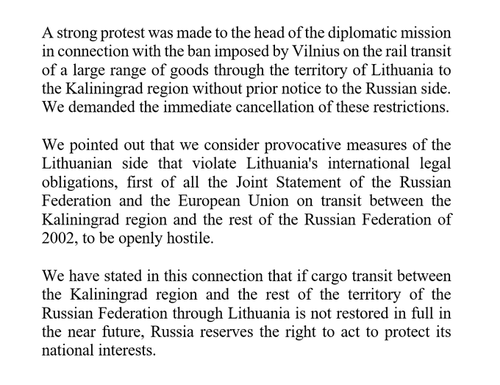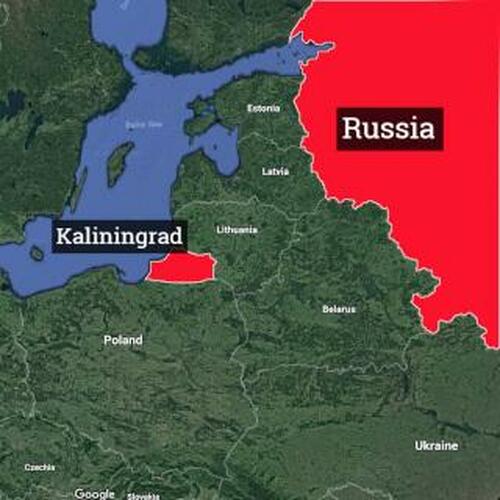'Quite possibly the biggest Russia-West provocation of the entire four-month long war in Ukraine has occurred this weekend, but few in the media establishment seem to be taking notice of the singular event which has the potential to quickly spiral toward a WW3 scenario.'
By Tyler Durden: Update (1100ET): The Russian Foreign Ministry has responded to Lithuania's partial blockade of Kaliningrad, writing in a statement that they consider the "provocative measures" to be "openly hostile" and warning that the Kremlin may take action to "protect its national interests."
Kaliningrad is sandwiched between the EU and NATO members Poland and Lithuania. Supplies from Russia are delivered via rail and gas pipelines through Lithuania - which announced last week that it was banning the rail transit of goods subject to EU sanctions, which include coal, advanced technology, metals and construction materials.
"If in the near future cargo transit between the Kaliningrad region and the rest of the territory of the Russian Federation through Lithuania is not restored in full, then Russia reserves the right to take actions to protect its national interests," the statement reads.
They have demanded that Lithuania immediately lift the ban on a number of goods to the Kaliningrad region.
Earlier Monday, the Kremlin called Lithuania's announcement "unprecedented" and "in violation of everything there is."
"The situation is more than serious and it requires a very deep analysis before formulating any measures and decisions," said Kremlin spokesman Dmitry Peskov in a statement to the press.
Lithuanian Foreign Minister Gabrielius Landsbergis said they were simply complying with sanctions imposed by the EU, and that they were taken after "consultation with the European Commission and under its guidelines."
"Sanctioned goods (will) no longer be allowed to transit Lithuanian territory," he added.
Kaliningrad governor Anton Alikhanov says that the ban, which was confirmed on Friday, affects roughly 50% of all imports. He urged citizens not to panic-buy...
...to no avail.
PANIC SHOPPING IN KALININGRAD pic.twitter.com/WYzZ5Ww9BX
— The_Real_Fly (@The_Real_Fly) June 20, 2022
* * *
Quite possibly the biggest Russia-West provocation of the entire four-month long war in Ukraine has occurred this weekend, but few in the media establishment seem to be taking notice of the singular event which has the potential to quickly spiral toward a WW3 scenario.
Baltic EU/NATO member Lithuania has implemented a ban on all rail transit goods going to Russia's far-western exclave of Kaliningrad, after transport authorities initially announced the provocative measure on Friday. "The EU sanctions list notably includes coal, metals, construction materials and advanced technology, and Alikhanov said the ban would cover around 50% of the items that Kaliningrad imports," Reuters wrote.
This has given way to fears of panic buying breaking out in Kaliningrad Oblast, which is Russian sovereign territory on the Baltic Sea, but which is sandwiched between Lithuania and Poland, and is thus reliant on overland shipping for passage via its EU neighbors.
Anton Alikhanov, the governor of the Russian oblast which has a total population of some one million people (with Kaliningrad city including almost 450,000 - and 800,000 total if outlying suburbs are counted) is urging calm:
Urging citizens not to resort to panic buying, Alikhanov said two vessels were already ferrying goods between Kaliningrad and Saint Petersburg, and seven more would be in service by the end of the year.
"Our ferries will handle all the cargo", he said on Saturday.
Russian officials and media have long warned against what they dubbed Western aims to "blockade" Kaliningrad. Crucially, the EU enforcement measure being implemented from Vilnius marks a complete break in a three decade long treaty that's been in effect...
RUSSIAN-LITHUANIAN TREATY REGARDING KALININGRAD, 1993https://t.co/4LatUKPN6J pic.twitter.com/ahwCYWMt8c
— The_Real_Fly (@The_Real_Fly) June 19, 2022
Ahead of the new Lithuanian transit ban taking effect, the state railways service was reportedly awaiting final word from the European Commission on enforcing it:
The cargo unit of Lithuania's state railways service set out details of the ban in a letter to clients following "clarification" from the European Commission on the mechanism for applying the sanctions.
Previously, Lithuanian Deputy Foreign Minister Mantas Adomenas said the ministry was waiting for "clarification from the European Commission on applying European sanctions to Kaliningrad cargo transit."
Brussels then ruled that "sanctioned goods and cargo should still be prohibited even if they travel from one part of Russia to another but through EU territory," according to Rueters/Rferl.
In Moscow's eyes, this is tantamount to laying economic siege to part of Russia's sovereign territory and one million of its citizens. When the EU first proposed the blockage of goods as part of the last major sanctions package in early April, Kremlin officials warned of war given Moscow would have to "break the blockade" for the sake if its citizens.
One escalation step closer to WW3 today. The West by de facto putting Kaliningrad under seige is goading Russia to roll into the Baltics. https://t.co/Q6wIGz6xFb
— Mark Sleboda (@MarkSleboda1) June 18, 2022
According to an April 6th statement in Russia's TASS by a state Duma official:
Statements from the West about a possible blockade of Kaliningrad is testing the waters, but Russia can ‘break the blockade’ in case these threats become a reality, it has an experience, Vladimir Dzhabarov, first deputy head of the Federation Council upper house’s Committee for International affairs, said on Wednesday.
"I think that for now, this is a game, testing the waters <…>. In case of a blockade, as they are saying, the Soviet Union knows how to break the blockades, we (Russia as the successor of the Soviet Union - TASS) have vast experience," the senator said.
"If they want to go to the length of making us break this blockade to save the lives of our people, who live there, we can do this," Dzhabarov said in a video interview at the press center of Parlamentskaya Gazeta (Parliamentary Newspaper).
He expressed hope, however, that the West "will have enough brains to opt against this".
Kaliningrad's governor Alikhanov has already called on Russian federal authorities to prepare tit-for-tat measures against Lithuania in wake of the transit ban.
The blockade of the Kaliningrad🇷🇺region may become a reason for the outbreak of war B/T Russia & NATO
— Marialvw (@arktinentuuli) April 8, 2022
🇪🇺has published a PR on the fifth package of sanctions against🇷🇺
The document,in particular, prohibits transit of goods by 🇷🇺&🇧🇾 transport operators through the territory of 🇪🇺 pic.twitter.com/M7k2XAxP0S
"These steps are illegal and may entail far-reaching implications for Lithuania and the European Union. In particular, I would like to quote a few paragraphs from the Joint Statement on EU Enlargement, with references to international agreements, the documents which both the European community and the Russian Federation acceded to," Alikhanov said Saturday.
Additionally he cited a key condition that was part of Lithuania’s 2004 accession to the EU. He quoted the prior agreement saying that the Baltic state "will apply in practice the principle of freedom of transit of goods, including energy, between the Kaliningrad Region and the rest of Russian territory."
"In particular, we confirm that there shall be freedom of such transit, and that the goods in such transit shall not be subject to unnecessary delays or restrictions and shall be exempt from customs duties and transit duties or other charges related to transit," Alikhanov quoted the Joint Statement further as saying.



No comments:
Post a Comment